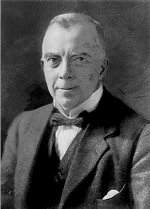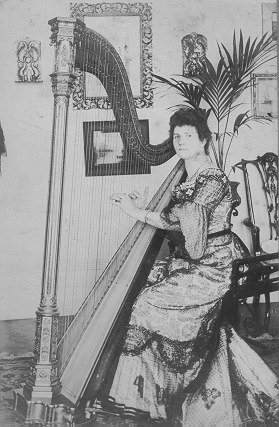When he came home from the office of an evening it became the custom for my sister and myself to rush to the front door as soon as we heard the jangle of his keys. My sister rushed to embrace him and received the affectionate response that was her due. I was dissatisfied with the greeting that came to me, and became resolved to put the matter to the test. One evening I rushed to embrace him as she had done. He seemed surprised and taken aback. He did kiss me, but without affection. I resolved never to approach him like that again. Fathers, do not hesitate to show affection for your small sons, or you may be doing them considerable harm in later life. Do not hesitate to take them on your lap and kiss them even if you would have preferred daughters. Even when they are growing up, take them by the hand occasionally. Show them that you love them, or you may be causing them considerable damage in later life. I have seen fathers do this and noted the look of satisfaction on the boy’s face. My father came of a non-conformist family who probably thought it was unmanly to show signs of affection especially between the same sex. But I happened to be an affectionate sort of child who expected to receive some signs of affection in return. I felt deprived if I received nothing from the parent who was obviously the most important member of the family. It was never enough that I had my two mothers who adored me. He was obviously the head of the family and I had to appeal to him too. For some time after we had gone to live in Vineyard Hill there was a gap in the houses opposite, an open field remaining free from suburban villas. Perhaps it was one of the things that may have recommended the house to my father and mother. For some years we had this open field opposite, which was to be enclosed with more houses as time went on. Of course we were never allowed to go and play in this strip of country. We might have been contaminated by the riff-raff of Kenilworth Avenue who disported themselves thereon, even presuming to come right up to the pavement opposite our house. If we wanted to play with the children of another family, unless we asked them to tea, we had to go on an expedition up to the Common which we did from time to time. I remember those expeditions very well. We went up in the pram, or walking part of the way, up the hill and right by Wimbledon Park House where Nelson had once courted Lady Hamilton, then on by what was later to become the Wimbledon Tennis Courts, past Mrs. Lashem’s cottage, who we hoped would not be leering out of the window, or in the garden, for she was rather a frightening witch-like creature, and then on past the parish church until we came at last to the Village and the Common. There we would foregather with Nanny Stone or Nanny Dampney and find a chosen spot there we would disport ourselves, camping out for the day. I remember the games we played, the good times we had and what a sad thing it was when we had to pack up for the day and start for home. At home I would look out of the window, and watch a concourse of errand boys straggling over their bicycles in the middle of the road (for there were few cars in those days). I would wonder what they were discussing; therefore taking a surreptitious ten minutes off from their duties. Then suddenly they would break up and fly off in different directions to continue their errandry. I often wished I could join them, but we were deprived by class distinctions. At the top of our very pleasant garden that sloped up the hill towards the gardens of Arthur Road, you could see the Houses of Parliament in the distance, Westminster Abbey and St Paul’s. Then from the windows of the "Bachelor’s Room" on the other side of the house, you could look right across the roofs of the houses opposite, even after they were built, and see the Crystal Palace shining on a distant hill. So we were not deprived in our environment. The time soon came for my sister and me to be sent to our first Dame’s School and we were most fortunate in this. Somewhere up near the Common resided the two Misses Merrington, who offered some excellent first tuition for those who could afford to send their children there. They had a book called "Colour Parsing" and they gave their pupils the opportunity of enjoying this game, as it really was. I have never heard of "colour parsing" elsewhere and I cannot help wondering why it appears to be unknown outside our Dame’s School. With what relish I underlined the verbs in red crayons, the nouns in blue, the adjectives in green, the conjunctions in yellow … I can remember the fun of doing grammar, so to this day I wonder if using colours may now be useful in teaching a subject, sadly so often neglected today. Particularly it may help children who are dyslexic but may be this is already being done. There is another thing that I might have picked up from my Dame’s School. From childhood I have always associated the letters of the alphabet and the numbers with colours. A is blue, B is brown, C is parchment, D is dark, E is a bright red, F is a dark red, etc. I cannot help seeing these colours whenever I spell or think of words. It is understandable that P should be pink and R red. But why should S be light green? For a long time I thought all people saw the same colours. But from enquiry I find this is not so. It seems to be unique that the key of A is blue and the key of B brown. Did I pick these colours up from some chart the Misses Merrington may have had in which A was blue, B brown etc, and were these colours so assimilated in my brain that I now cannot get rid of them? Not that I should want to, for I find them very helpful in remembering the spelling of words. Here again might there not be some help for people who are dyslexic? At Miss Merrington’s there were two boys called Philip and Alexander Cardew with whom we seem to have chummed up, perhaps because we were both of Cornish origin though this was never mentioned. The Cardews came to tea with us at Vineyard Hill Road and I went to their house on the Common. I was really envious of their house which opened right onto the Common, the wild country that I loved so much. My sister Phyllis was more or less Philip’s age. I really loved Alexander who was more mine. I had a kind of David and Jonathan friendship with him such as I have never had with any other man. I was about eight. The Cardew brothers taught me to ride a bicycle and Philip used to bring me home on the back of his bicycle. They really led me to acquire a bicycle of my own. In those days, with few cars about it was quite regular for children to learn to ride a bicycle at an early age. My parents gave me a bicycle at one of my birthdays and I soon learnt to master it with the help of the Cardews. But we drifted apart from them when I went to my Prep School at the age of nine, and I never saw Alexander again until once at about the age of seventeen when I went to a local dance. Among the young men who were piloting their girls around the hall I suddenly saw one gazing at me as I gazed at him. I realised that it was Alexander. It was difficult to speak to him in the atmosphere of the ballroom, but I resolved to have a word with him at the end. But at the end of the dance when I looked out for him he had gone and I was never to see him again. I cannot remember the names of any of the girls I danced with, but I can remember to this day how I saw Alexander for the last time. It is thus that a friend, a soul-mate, may pass into the night, never to be seen again. |
||||||

